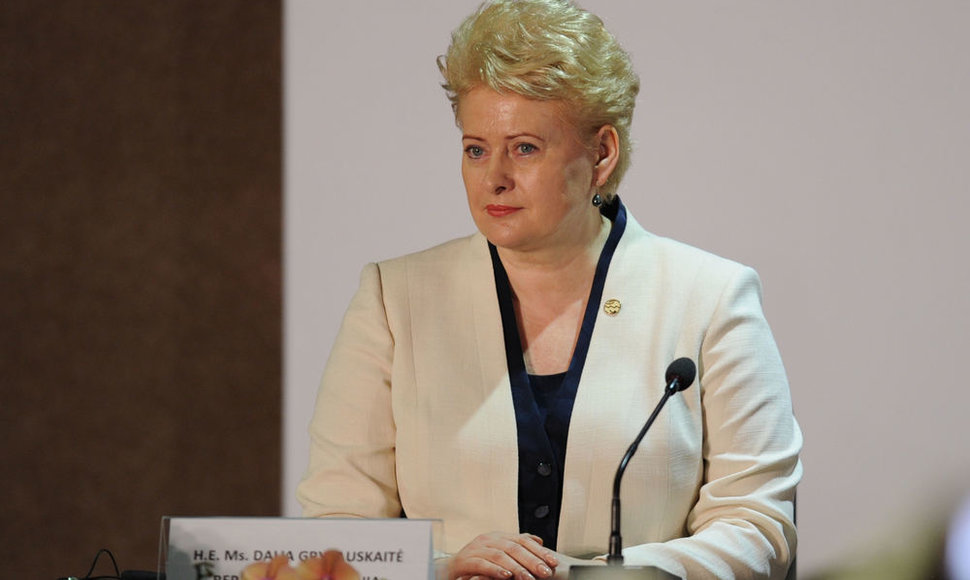According to the president, this time Lithuania is better prepared for possible recession after the country stopped overspending, and one should not expect quick solutions to the EU's economic and financial problems as Germany is not willing to assume responsibility for other member states which are not always well-behaved.
"We can talk about the risk that Europe might face the second wave of recession," the president told journalists.
"Europe has to make decisions on whether it wants further integration, deeper integration – economic, financial and political – or we are still facing the prospect of the euro zone's collapse and further complications for the European Union itself," Grybauskaitė said.
The two-day summit in Brussels started on Thursday with the major countries disagreeing over one of the key instruments – common euro zone bonds. Germany has so far refused to back this project and take on risk for debts of other euro zone members calling for agreements on common controls first.
"The markets want Germany to become the state which would pay for everyone else and take on all commitments for everyone, and other countries would be able to borrow easily without commitments. That's not going to happen," Grybauskaite said.
In her words, having cut its budget deficit, Lithuania is now better prepared for possible problems, and the fiscal pact approved by the Seimas on Thursday will prevent overspending in the future.
"I really hope that this time Lithuania is safer because our deficit, the expenditure level compared to what we earn, is significantly lower. We will face the recession better-prepared, having better adjusted our expenses and doing that in a more rational way," Grybauskaitė said.
"Besides, the Seimas ratified the fiscal discipline treaty today, and that's a very serious restraint for all future political powers not to exceed the 3 percent deficit. It's a very good safeguard, a huge commitment for every political power, any new government in Lithuania," the president said.
Commenting on the proposal to build a banking union with common controls and common guarantees in the EU, the Lithuanian president said at this point the idea was without contents, therefore, "it's too early to say yeas or no."
"I don’t now who we want to deceive – ourselves or the markets, but we won't be able to play around so long and we have to seriously talk whether we are integrating the banking system and having common controls or not. Not all countries are ready for that, therefore, it will take time," the Lithuanian leader said.
Officials say any decisions on common euro zone bonds and the banking system are not expected until December. Until then, the EU hopes to find the balance between commitments by crisis-hit countries to follow the rules of fiscal discipline and the help of richer countries, first of all, Germany.
"Merging debts is only possible if strict state financial control is ensured. Intensive talks are taking place as to what the balance between solidarity and responsibility should be," Algirdas Šemeta, Lithuanian-delegated European Commissioner for Taxation and Customs Union, Audit and Anti-Fraud, said on Thursday.
Diplomats say Europe is divided over measures for dealing with the crisis, with heavily-indebted southern member states calling for increasing spending to stimulate growth. Meanwhile Germany and the Nordic group, including Lithuania, stress the need for fiscal discipline saying that borrowing-based growth is impossible.
Diplomats say a separate pact on growth will be announced, and the only really new measure is raising capital of the European Investment Bank by EUR 10 billion.
Šemeta said the bank would be able to use additional capital to fund growth-promoting projects.
Grybauskaitė also acknowledged that employment- and growth-promoting measures in the pact "are not something special."
"The growth pact is the sum of certain measures all countries, including Lithuania, will have to implement. But those measures are not something special or new. They are needed as an annex to the fiscal pact. These processes have to go along, in the framework of those financial means countries have they have to focus on the countries which would promote employment and growth," the president said.
The 2014-2020 EU budget will be also discussed at the highest level for the fist time at the summit in Brussels. Lithuania is not satisfied with the European Commission's original proposal regarding structural aid, direct agriculture payments, and allocations for the decommissioning of Ignalina nuclear power plant.
"Lithuania's government said long ago, and so did I, that this package covering the size of structural aid, agricultural payments is not acceptable to all Baltic states, and we all three Baltic states will negotiate together as it would strengthen our position," Grybauskaitė said.
The Lithuanian president and the Latvian and Estonian prime minister are scheduled to meet with President of the European Commission, Jose Manuel Barroso, on Friday.
2012 06 28
Lithuanian President in Brussels: Europe needs more integration
Europe is facing the second wave of recession, and deeper economic, financial and political integration is needed in the European Union to deal with the crisis, Lithuanian President Dalia Grybauskaitė, attending a summit in Brussels, said on Thursday.
Report mistake
Successfully sent
Thank you












